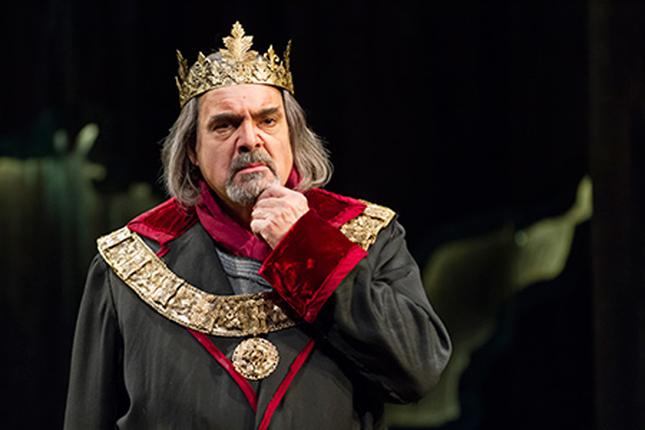Gero and Keach: Shakespearean Roles of Two Lifetimes
By • June 9, 2014 0 1403

When you hear a couple of guys, great actors both, talk about William Shakespeare, you immediately start thinking about: Shakespeare.
In the case of listening to the conversation that swirled around actors Ed Gero and Stacey Keach and moderator John Andrews, the president of the Shakespeare Guild at the Woman’s National Democratic Club recently, you particularly started thinking about the great “Seven Ages of Man” speech in the Bard’s “As You Like It,” which begins thusly:
“All the world’s a stage,
And all the men and women merely players;
They have their exits and their entrances,
And one man in his time plays many parts,
His acts being seven ages . . .”
Shakespeare being a man of the stage often referenced the stage—the play within a play in “Hamlet” and Hamlet’s instructions to the players, Prospero’s farewell speech in “The Tempest.” The “Seven Ages of Man” speech is direct and precise, and it’s about theater as well as life its own self.
This resonated when you heard Gero and Keach — who could and probably have given master classes on acting — started talking about the roles they were playing at Harman Hall in the two parts of “Henry IV.” Gero played the king of the title role, and Keach took on Falstaff, the boisterous boon companion to Prince Hal, the future Henry V.
The professional lives and trajectories of Gero and Keach have been different. Keach, although he is one of our finest Shakespearean actors, has taken a few detours into movies and television, not always choosing wisely, as he has acknowledged, Nevertheless, he has played his characters memorably. Gero has spent a lot of time on the stage in Washington (and elsewhere), assaying 60 Shakespearean parts along the way. Whatever stage of man they may be in now, rich in family life, children and so on, the roles they have played brought them together on stage—notably in a Chicago-Goodman-Theatre-based production of “King Lear,” in which Gero was Gloucester to Keach’s Lear—but the roles themselves have criss-crossed and bumped into each other.
“I played Falstaff once when I was in my twenties,” Keach said. “I had to gain some weight and wisdom I think to play him then. I didn’t have to do that this time around. I need to lose some weight now.”
Gero’s experience with the history plays and the paths of the Henry’s in particular seems like an alternative life lived inside the theatre. He played the lead in “Henry V” at the Folger, when he too was much younger. Then, he performed in “Richard II” as the rebellious Bolingbroke who usurps the crown of Richard II, not once but twice, opposite Philip Goodwin and Richard Thomas. Bolingbroke would become a troubled and often guilt-ridden Henry IV, fending off rebellions and uprising, trying to separate his son Henry from Falstaff.
“Things can get circular, but I think all of that helps you bring the virtue of experience to the parts,” Gero said. “I’m the father, I was the son, I was the usurper and now the king. Henry IV has become a master politician. He knows how to manipulate people, hold and exercise power, like a modern politician. He’s a modern man and that resonates today.”
“I’ve tried not to play Falstaff like a buffoon, which is often done,” Keach said. “There is a huge amount of comedy in the part, but he sees himself as a serious man. You not only have to get the laughs, you have to get the audience not just to like Falstaff but to respect him. His biggest audience is Prince Hal, and when he becomes king in the second play, the comedy stops. Things become more like an elegy. You should take into account that now Hal has to be Henry. He has to act like a king, and he can’t embrace Falstaff, who has some hopes. You can see that again in “Henry V”, when he has to approve of the execution of one of his old companions for desertion.”
Keach is associated with many screen roles, big and little, and is therefore better known. For anybody who goes to the theater a lot in Washington, he has performed brilliantly here as “Richard III.” For this writer’s money, he played the best Richard III ever: dangerous, mocking, self-aware and funny. He also played Lear and Macbeth. But then, there’s a woman who comes up to him after the talk and says ,“You’re my favorite Jesse James.” It was a reference that means a lot to Keach obviously but very little to anyone who hasn’t seen Walter Hill’s “The Long Riders,” a wondrous, stylized, banjo and guitar-driven Western about the outlaws Jesse and Frank James and the Younger boys, robbing banks, one step ahead of a fatal bullet. If you watched television and the “Mike Hammer” private eye series, where Keach was tough and slick with a mustache and a cocked hat, well, there you are. You remember.
Gero, too, has had his share of parts—on the stage—where he’s delivered memorable performance and been rewarded with Helen Hayes Awards. He’s been Scrooge at Ford’s Theater and the artist Mark Rothko. Now, he’s taking on the part of Supreme Court Justice Anthony Scalia for Arena Stage next season.
“Interesting, fascinating,” Gero said of his preparation for the man and the role.
The world remains the same: a stage for a man to play many parts.
— “Henry IV” parts one and two will be playing at the Harman Theatre through this weekend. Check the Washington Shakespeare Company for tickets, dates and times.

